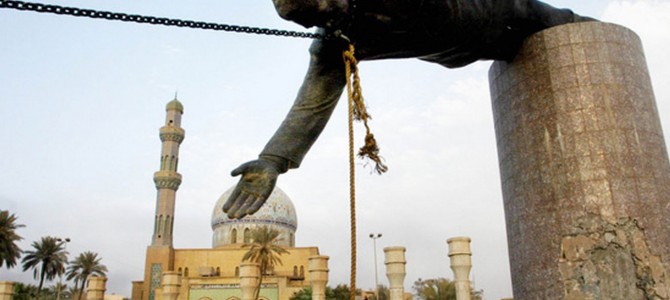
In the past few weeks, a number of Republican presidential contenders have been asked about the Iraq War and offered a variety of unsatisfying answers. And in fairness to them, hypothetical questions about the Middle East are insane.
But, then again, so are hypothetical answers. And it seems that hawks are disinclined to admit that the Iraq invasion was a mistake because they feel it would be a repudiation of all future military action rather than simply a repudiation of this one conflict. And those still championing the Iraq War’s legacy offer a single basic argument: If we didn’t do it, the situation would have been a lot worse. For starters, this is as tenuous as any other counterfactual history.
“No, I don’t believe it was” a mistake to invade Iraq, Marco Rubio told Fox News in one iteration of his evolving position. “The world is a better place because Saddam Hussein doesn’t run Iraq.”
Here at The Federalist, David Patten argued that Saddam Hussein, a terrible guy, was a bigger threat in 2003 than ISIS is today. He’s concerned that Republican presidential candidates who claim “if I knew then what I know now, I would not have authorized the invasion of Iraq” are admitting that the Middle East would have been better off had the United States not in invaded Iraq in 2003. This contention, he says, is a “groundless” assumption.
Well, it’s easy to defend a war if you can concoct new justifications whenever the old ones don’t work out for you. It’s nice that Saddam Hussein doesn’t run Iraq. But it’s not everything.
A reminder: There was a list of reasons for deposing the Baathists in Iraq, but the leading political argument—the one that convinced the American public that war was a necessity—was the alleged presence of weapons of mass destruction. After 9/11, Americans were understandably anxious about the potential catastrophic consequences of a terror-friendly nation possessing this kind of technology. But there is no way around the fact that this persuasive reason turned out to be erroneous.
A parallel—and more quixotic—argument revolved around the theory that once Saddam was overthrown our presence would spark some kind of liberal transformation in the Middle East. That too turned out to be false—with devastating consequences. And it had little to do with our military execution.
Our failure was political: the Bush administration (and many others) overestimated the appetite of people in the region to embrace secular institutions and freedoms. Consequently, many more Americans died trying to create a stable Iraq than did fighting for the safety of Americans. The United States sacrificed those lives, not as detractors claim, for oil or empire, but for moral reasons. Yet, in the end, the Iraqi people failed because of their own historical, religious and cultural problems.
So even if we judge the Iraq invasion using the criterions given to us by those who advocated for it, the war was a failure.
But even if we set aside that failure, is there any honest observer of the Middle East who believes it’s more stable today than it was in 2002? A more stable Middle East doesn’t necessarily mean a more moral one, that’s true, but even with Hussein in the ground there’s little evidence Americans are any less in danger from a rogue ISIS-style terror attack than they were from Iraqi Baathists. The regime-change was supposed to produce security, not another kind of insecurity.
A group of Islamists, training and organizing with little regard for self-preservation, are no less terrible than Saddam, and in many ways perhaps more dangerous. ISIS also threatens and slaughters minorities across the Middle East. And the ISIS story is not over. A Saddam-led Iraq might have been easier to contain than a disparate terrorist army functioning in an unpredictable Middle East. ISIS took Ramadi last week, a city Americans had saved in the past; a city that is only one of many that will fall without the assistance of the United States. In the end, more than likely we will have to protect this brittle nation in perpetuity.
Then, of course, unconstrained by their rivals, Iran, a nation whose technological and economic infrastructure is superior is stronger than Iraq, has become more dangerous than ever. It’s a country with access to vast amounts of oil, and is more than likely to be on the threshold of nuclear weapons soon. Not only does it boast an impressive military, but it has proxy armies throughout the Middle East threatening American allies. It’s a country run by End-of-Days theocrats who benefited most from the American invasion of Iraq.
Yet Patten can’t understand how so many Americans can support military action against ISIS but still think we were wrong about invading Iraq. He claims that Americans might be overinflating the present-day threat posed by ISIS and underestimating or forgetting the threat posed by Saddam when we invaded. Maybe Americans do forget—though it is clear now that Saddam did not pose the threat we were told he did. Maybe Americans just have a visceral reaction when they see innocent people being beheaded. Maybe they have a sense of righteousness. Maybe they want to kill bad guys. Or maybe, they learned a lesson that seems pretty clear to me: we can fight the enemy, but it’s foolish to attempt to social engineer abroad. Maybe, intuitively, Americans comprehend the distinction.
Whatever the case, admitting that Iraq was a mistake neither confirms the Progressive position nor disproves the hawk’s worldview. ISIS is real. Iran is not Iraq. Neither does the Iraq invasion excuse Obama’s muddled foreign policy or our deteriorating position in Middle East. Every president inherits a world with problems left to them by history. But the Iraq War did not accomplish any of its broader objectives and it failed to make us safer, the region more stable or the people of the Middle East much freer. Republicans have little to gain by trying to reimagine history.









